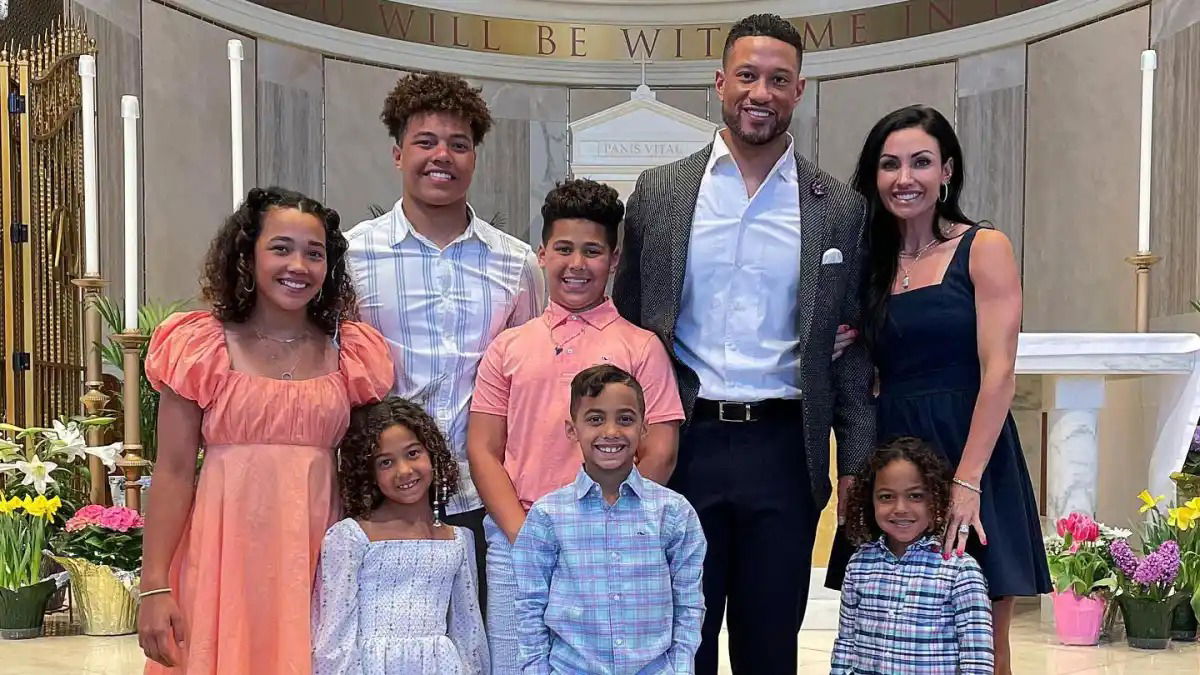

As Marcus Freeman prepares for his fourth year in command, he has spoken out on the need to preserve Notre Dame’s historic rivalries, especially with USC, believing that ‘nobody cares what the record is’ in these old-school skirmishes—what counts is the emotion and tradition behind them. But the true tale behind the headlines is how Freeman balances the tremendous stresses of being a first-class college coach with the responsibilities of being a husband and father to six children. And if you want to know the secret ingredient to Marcus Freeman’s equilibrium, you have to get to know the woman keeping everything together—his wife, Joanna.
Watch What’s Trending Now!
Imagine this: a household filled with the vibrancy of six children—Vinny, Siena, Gino, Nico, Capri, and Rocco—and a teen, Bria, from another relationship. That’s a full-throated team, and Joanna’s the captain off the sidelines. She’s not only the glue of their household; she’s the underappreciated MVP of Marcus’s professional life. Before there were Notre Dame and national title ambitions, Joanna was the provider, holding down jobs as Marcus worked through coaching stints for minimal compensation.
ADVERTISEMENT
When a new opportunity threatened to split the family geographically, she didn’t hesitate—she packed up her life, quit her job, and moved with him, saying, “If you’re going to do this, we’re going to do this together.” That’s why in a conversation with Joel Klatt on the 16th of June, Freeman doesn’t back down in crediting his wife. “Number one, an unselfish wife, I always say, like I could not do my job if she wasn’t taking care of the major things at home,” says Freeman. Joanna is no-nonsense, like an “Italian pistol,” as Marcus describes her, who won’t hesitate to let him know if he’s being a jerk. But most importantly, she’s his anchor, raising their children with love and structure while Marcus is traveling or burning the midnight oil working in the film room.
Marcus Freeman doesn’t want to be a distant husband or absent father. He’s discovered ways to mesh his two realities. “When I come home sometimes and my wife has to go somewhere, they call me the babysitter, right? Dad’s babysitting tonight, and I’m saying, ‘Hold on, I’m your father, I’m not the babysitter.’ Like, what are we talking about?” he says. That’s the ugly part of this job: you have put so much, so much into it that the head guys tend to lose track of the fact that they have a family at home; there is a life outside the field. Marcus and Joanna’s tale isn’t a tale of having it all cut out for them. It’s a tale of teamwork, in all its definitions.
ADVERTISEMENT
Joanna sacrificed her journalism career to help Marcus and bring up their children, and the Irish head coach is the first to acknowledge he couldn’t work without her. He’s forever attempting to stop the clock from running, to make the time with his family last longer, but the hands keep moving. The children are growing up quickly, and so is his career. Freeman continues, “When I’m home, I try to be as present as I can, and I fail miserably a lot of times, but as much as I can get the kids and my wife into the office around our players like that, that gives me a chance to be a father and a husband but also a chance for my players to see me as a father and a husband, so we make it work.”
ADVERTISEMENT
It’s a lesson in life, not football. The children enjoy dashing around the practice ground, and the players catch glimpses of their coach as a different person. There are new challenges each year, but there are new memories, too, such as the time that he surprised his daughter at school play or the nights that he slipped in a bedtime story before a late return to the office. Ultimately, Marcus Freeman’s life is a reminder that balance isn’t perfection. It’s being present, giving your best effort, and relying on the people who care about you.
Marcus Freeman’s honest confessions
If you visualize the head coach at Notre Dame, you may envision a man with his ducks in a row—playbooks committed to memory, practice routines etched in stone, and a team that leans on his every utterance. But at home, things are far more improvised. Freeman is plainspoken that he is far from perfect on the See Ball Get Ball podcast; he didn’t blink when asked what’s more difficult—coaching a football team or raising six children. “It’s certainly the six kids at home,” he said with a smile. Football rules are black and white, but half a dozen kids? That’s an entirely different game.
ADVERTISEMENT
Freeman’s integrity regarding his weaknesses is refreshing. He confesses, “I fail often, right? I’m not the perfect father and perfect husband, but you try to be intentional,” he said. “You try to be intentional and present with your family when you are home. That’s probably more important than anything. If you go home and you’re physically there, but mentally you’re not there, then you failed your kids. You failed that opportunity that you had.”
He attempts to set his phone aside, to hear what his children have to say and be sure Joanna gets a word in edgewise as well. But he’s the first to acknowledge that it doesn’t always work. Sometimes work takes him away—mentally or physically—and those are the times that linger with him.
ADVERTISEMENT
ADVERTISEMENT
ADVERTISEMENT
ADVERTISEMENT
.png)
.png)
.png)



